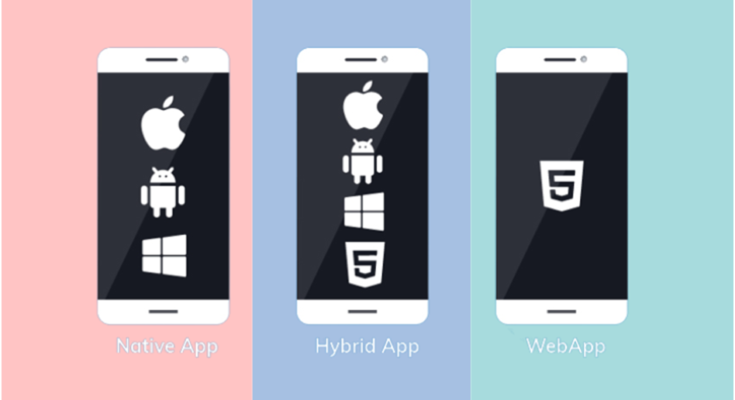According to Statista, the current revenues in the app market stand at $430.90 billion in 2022. These attractive numbers are enough to give testimony to its overall lucrative status. Hence, when businesses have its use, the advantages they will get are enormous.
However, when businesses enter the journey of mobile app development, the biggest worry that they come across is concerning choosing the kind of app they should develop.
In other words, the major hurdle they face is in deciding whether they should perform native, hybrid, or web app development. To streamline the choice formulation, I have curated the article for you.
Going through this guide, I am sure you will have a streamlined journey when you perform mobile app development.
So let’s begin.
Mobile App Types – Based on Technology
When you embark on the journey to build an app for your business, their subdivisions must be known carefully based on technology.
There are 3 basic kinds of mobile apps if we categorize them by the technology:
1. Native Apps
When we use the terminology native app development, it refers to the buildup of an app that can only run on one OS – that is only on Android, iOS, etc. This is due to the code that is used for the development purpose is for one processor alone.
As a result of this, they are only accessible via the different app stores instead of the web platform as regardless of the fact they display web content, they cannot live on the web or use its HTML.
Technologies Used during Native App Development
When developers enter the task of developing a native app, the technologies that get used for the purpose, for developing native iOS apps are Objective-C and Swift. Whereas, when it comes to developing a native Android app, Java or Kotlin gets used.
You may have understood what native apps are. You may have alternatively also enlightened yourself with the technologies that get channeled during the purpose of native app development. Let’s now get a comprehensive idea of their different pros and cons.
Pros and Cons of Native App Development
Pros:
Image source: decode.agency
In the image above, you can observe the different advantages of native app development. Let’s explained about them in detail.
- Delivers better app performance: Since they run, load, and execute faster alongside possessing very less bugs, the app performance is superior.
- Does not require internet access: Native apps can work in offline mode by default. Hence, in a situation wherein the internet connection may be weak, these apps can easily retrieve data. This is easy to perform through a web server thereby making it seamless to activate online features.
- User experience is out-of-the-box: Due to the app possessing offline capabilities, it becomes easy to deliver an out-of-the-box user experience.
- Ensures greater security: As a result of the native apps being compiled to assembly language, the source code does not get exposed. Hence, the rate of security is greater.
Cons:
Image source: decode.agency
The image above lists the cons related to native app development. Let’s discussed them in details.
- Is less flexible: Since the source code used for native app development can only be used on one platform, the prospect related to re-purposing gets ruled out completely.
- Requires more resources: Due to the dependency on building multiple code bases, therefore it becomes crucial to hire separate teams. Hence, the chance of requiring more resources goes up.
- Dependence on more support and maintenance: Maintenance costs are something that comes across as a major worry during native app development. Starting from making updates, to fixing bugs, all these aspects become difficult to handle during native app development.
Now that you have gotten a perspective on the concept of native apps, let’s know about the next subcategory into which mobile apps are divided, Hybrid Apps.
2. Hybrid Apps
Hybrid apps are those applications that possess components from native apps. Hence, possessing components from native apps, they have elements from web apps too. This makes their functioning on the web platform seamless too.
Technologies Used during Hybrid App Development
When we talk about the prospect of performing hybrid app development, different front-end technologies and languages get used.
JavaScript, HTML5, and CSS are majorly used during the purpose which in turn allows the end-solution to function as a cross-platform one.
Pros and Cons of Hybrid App Development
Pros:
- Costs for development are less as one code alone can get deployed across different platforms.
- Reusing codebase between two platforms is easy.
- Offering user-friendly plugins, it helps developers update apps seamlessly.
Cons:
- Hybrid frameworks do not offer adequate support for different native features.
- Does not deliver support for 3D graphics.
- There might be delays in getting access to new features.
Let’s now get educated about the third category of apps, Web Apps.
3. Web App Development
When we talk about the concept of web app development, it refers basically to the creation of solutions that get easily delivered to the users’ devices over the internet. Hence, it does not require download. Instead, they are easy to access through an active internet connection alone.
Technologies Used during Web App Development
When developers embark on the journey of web app development, there are a wide array of technologies that allows them in the process to ensure they can allow good connectivity, is easy to update, and so on. Some of the technologies that used to build a web app are Meteor JS, Django, Laravel, Motion UI, etc.
It is important now you learn about the different pros and cons of developing web apps to understand the scenarios best for their development.
Pros and Cons of Web App Development
Pros:
- Is easy to run through the user entering the URL.
- Does not require download.
- Updates are something whose instances get mitigated completely.
Cons:
- As internet connection is constantly necessary, in case the same is not available, the visibility may get lost completely.
- Safety and security are areas that may observe compromise taking place. This is due to features related to quality control systems not being available in the web apps.
- Instances of availability on the Apple App Store or Google Play Store are less. This might affect awareness about the solution among users.
So now that you know about the three mobile app types, you must have a question, how to determine which app type is right for you?
How to Make App Choice for Business?
We understand the challenges in choosing or formulating a choice between native, hybrid, and web app development. To make this easy keep these points in mind.
- For superior user experience at the best price, native apps are what you should develop.
- If your budget is limited, and you wish to get a product that lacks cross-platform compatibility issues, hybrid apps are what you should build.
- To avoid the worries related to approvals from the Google Play Store and the Apple App Store, web app development is the key.
Alongside these aspects, you must know your purpose and accordingly you need to do your research well. Once you have followed these aspects in detail, you can be sure of a successful app development journey.
Summing Up
The comprehensive guide entails the different mobile app types educating about their pros and cons, and scenarios when they can get used. Hence, before you enter the journey of selecting a type of app that you want to develop, you need to make sure you know your goals first. Ascertain if the goals and the app align in nature. You can alternatively connect with a dedicated partner for mobile app development.
With an understanding that they get about your app purpose and the business needs you have, they will partner with you to make an ideal selection to help you get closer to the path of success and profits. So what are you waiting for; outsource mobile app development services today from reliable company to turn your ideas into reality!
Author Bio:
I am a project coordinator at XongoLab Technologies, a reputed mobile app development company specializing in building robust Android and iOS applications. As a hobby, I love to write informative articles and share my knowledge through content marketing.




